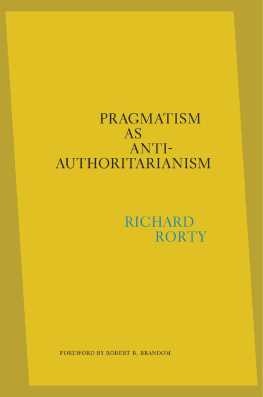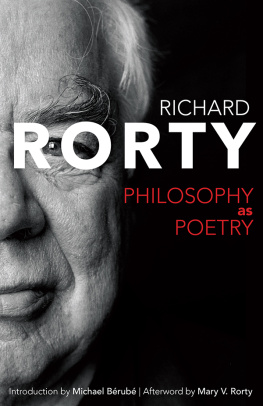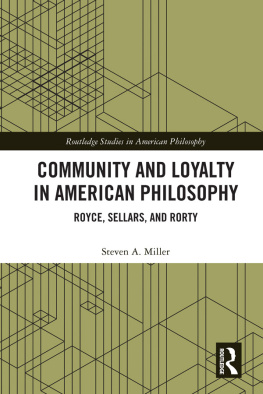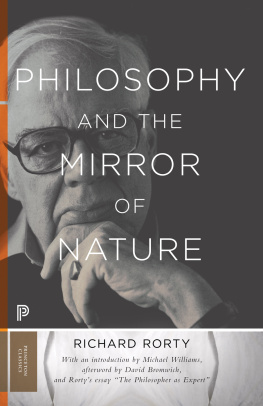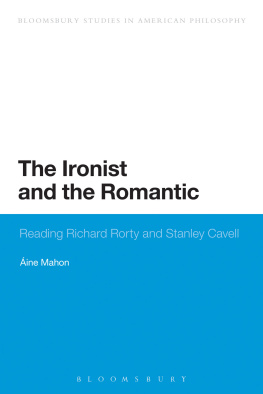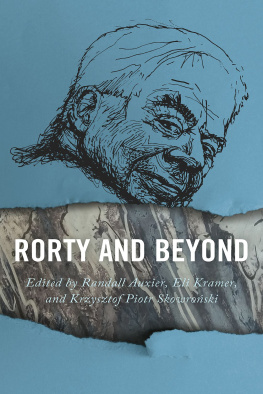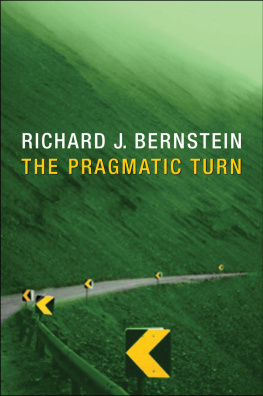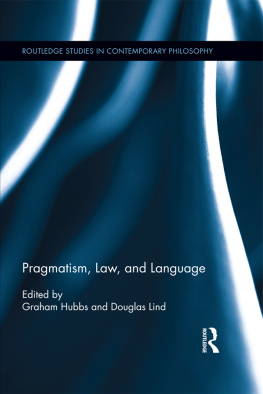Pragmatism as Anti-Authoritarianism
Richard Rorty
Edited by Eduardo Mendieta
Foreword by Robert B. Brandom
THE BELKNAP PRESS OF HARVARD UNIVERSITY PRESS
Cambridge, Massachusetts, and London, England 2021
Copyright 2021 by the President and Fellows of Harvard College
All rights reserved
Cover design: Sam Potts
978-0-674-24891-5 (cloth)
978-0-674-27006-0 (EPUB)
978-0-674-27007-7 (PDF)
The Library of Congress has cataloged the printed edition as follows:
Names: Rorty, Richard, author. | Mendieta, Eduardo, editor. | Brandom, Robert, writer of foreword.
Title: Pragmatism as anti-authoritarianism / Richard Rorty ; edited by Eduardo Mendieta; foreword by Robert B. Brandom.
Description: Cambridge, Massachusetts : The Belknap Press of Harvard University Press, 2021. | Includes bibliographical references and index.
Identifiers: LCCN 2021007200
Subjects: LCSH: Pragmatism. | Authoritarianism. | Ethics.
Classification: LCC B832 .R584 2021 | DDC 144/.3dc23
LC record available at https://lccn.loc.gov/2021007200
Contents
- BY ROBERT B. BRANDOM
- BY EDUARDO MENDIETA
ROBERT B. BRANDOM
Pragmatism as Anti-Authoritarianism is Richard Rortys long-lost, last book. Its first English-language publication is an epoch-making event. Written ten years before his death, this volume presents Rortys final, mature version and vision of his path-breaking pragmatism. Further, it announces a substantially new phase in the development of that view. At its core is a commitment to human self-determination. The principal animating and orienting impulse of pragmatism is now identified as its anti-authoritarianism. Its ultimate goal is our emancipation, both in practice and in theory, from subjection to nonhuman authority. Pragmatism points us at the sort of freedom that consists in humans taking full rational responsibility for our own doings and claimings.
On this conception, pragmatism is an intellectual movement of world-historical significance. Rorty construes pragmatism as aiming at nothing less than a second Enlightenmentas offering what is needed properly to complete the task begun in early modern times by the first Enlightenment. The key to the conceptual division of labor he envisages between the two historical phases of the Enlightenment is the anti-authoritarianism of the titlea theoretical and a practical attitude. It is the rejection in both spheres of the traditional understanding of authority and responsibility in terms of subordination and obedience. It is to be replaced by a conception of judging and acting as exercising the authority to undertake commitments that come with a correlative responsibility to justify them, to offer reasons for them that can be assessed by our fellow discursive practitioners.
As Rorty is thinking of it, the great achievement of the original Enlightenment is on the side of ethics. In broadest terms, it is substituting the secular for the sacred in our understanding of the source and nature of our most fundamental obligations. The tradition that the Enlightenment reacted against and recoiled from took normative statuses of authority and responsibility to be independent of the attitudes of those whose statuses they were. Norms were understood as ontologically determined by the objective structure of things, epitomized by the scala natura, the Great Chain of Being. That is a hierarchical ontological structure of superiority and subordination, in which superiors have the authority to command and subordinates the responsibility to obey. (It is what determines My station and its duties, as the title of F. H. Bradleys essay has it.) It is a natural structure with intrinsically normative significance. In its later Christianized form, it is taken to have been instituted by the supernatural fiat of the ultimate superior and authority, God. Thence derives the divine right of kings, devolved through the various feudal ranks, bottoming out in the righteousness of mans dominion over the beasts. In both forms, those that take the norms to be read off of the natures of things and those that also take those normatively significant natures to be supernaturally ordained, the ultimate source of our responsibilities and obligations lies outside of us, in something non-human, in the way things anyway are, apart from and independently of our practical activities and attitudes. Our job is to conform our attitudes and practices to these normative statuses of superiority and subordination, authority and responsibility, about which we dont have a say.
From the pragmatist point of view that Rorty sees as prefigured by the Enlightenment, both the natural and the supernatural versions of this traditional picture are fetishistic, in Marxs technical sense. They reify what are in fact the products of human practices and project them into the non-human, merely natural or supernatural, world. By contrast, in its finest flowering in social contract theories of political obligation such as those of Hobbes, Locke, and Rousseau, Enlightenment thought grounds normative statuses of authority and responsibility instead in human attitudes and practices of consent, negotiation, and agreement. In seeing this humanizing of the norms governing our practical activity as the core Enlightenment insight, Rorty is at one with Kants account in his popular essay Was Ist Aufklrung? For there Kant construes the Enlightenment as announcing the emancipation and coming to maturity of humanity, our casting off our juvenile need for and dependence on normative tutelage from without, in favor of the adult dignity that consists in ourselves taking responsibility for our ultimate commitments.
In the background of this understanding of the message of the Enlightenment is Kants account of positive freedom: the freedom to do something one could not otherwise do, as opposed to the negative freedom that consists in freedom from some constraint. Kant understands freedom as autonomy: the authority to bind ourselves (autos) by norms (nomos), to acknowledge and undertake commitments, making ourselves responsible by taking ourselves to be responsible. The resulting constraint of commitments is intelligible as distinctively normative constraint (as opposed to the matter-of-factual constraint of compulsion by greater power) just insofar as it is the result of self-binding. This conception radicalizes what Kant learned from Rousseaus dictum that obedience to a law one has prescribed for oneself is freedom. For Kant turns Rousseaus definition of freedom into a criterion of demarcation of the genuinely normative. By analyzing normativity in terms of autonomya distinctive kind of positive freedomKant moves decisively beyond the traditional understanding of normativity in terms of subordination and obedience. Here the central inspiration of the Enlightenment achieves its most explicit self-conscious expression. This articulation of the intimate and ineluctable connection between freedom and genuinely normative bindingness underwrites a distinctive liberal, democratic approach to politics. It shows up as having as its implicit telos that everyone who is bound by a law should have a say in imposing that law: the ideal of universal suffrage, in the sense of according all those bound by (responsible to) laws the authority to make them.
The edifying lesson Rorty sees the Enlightenment as teaching is that fear of God and fealty to His authority are to be replaced by human freedom, self-reliance, and solidarity in the form of individual autonomy on the side of ethics, and social commitment to and participation in liberal political practices and institutions, on the side of politics. Our practices are the real source of our commitments and responsibilities, and those practices should be understood as involving no authority beyond what we institute and exercise by engaging in them. Instead of looking outside of human practice for our ultimate commitments, we are to look to what emerges in conducting the human conversation. Liberal political institutions are to structure that conversation procedurallyin effect, to provide the

